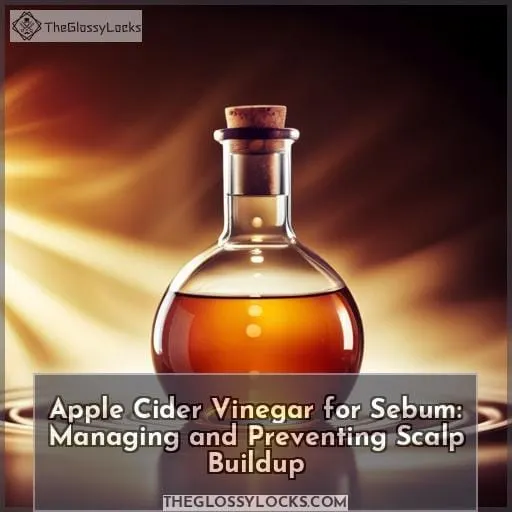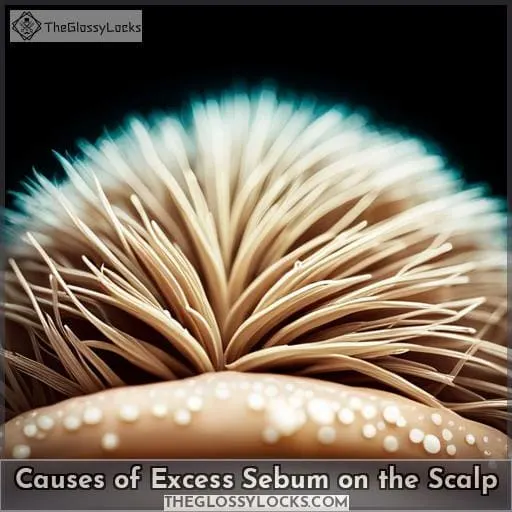This site is supported by our readers. We may earn a commission, at no cost to you, if you purchase through links.
 Do you suffer from excessive sebum on your scalp? Having too much of this waxy, oily substance can lead to dandruff, acne, and even hair loss.
Do you suffer from excessive sebum on your scalp? Having too much of this waxy, oily substance can lead to dandruff, acne, and even hair loss.
In this article, we’ll explore how ACV works as a natural remedy for treating and preventing scalp buildup. You’ll learn the causes of excess sebum production and home remedies that are effective in managing it.
Plus, discover the benefits of using apple cider vinegar for hair health maintenance so you can incorporate it into your daily routine with ease!
Table Of Contents
- Key Takeaways
- What is Sebum Buildup?
- Causes of Excess Sebum on the Scalp
- Home Remedies for Managing Sebum Buildup
- Preventing Sebum Buildup on the Scalp
- When to Seek Professional Help for Sebum Buildup
- The Benefits of Apple Cider Vinegar for Hair
- How to Incorporate Apple Cider Vinegar Into Your Hair Care Routine
- Potential Downsides of Using Apple Cider Vinegar for Sebum Management
- Conclusion
Key Takeaways
- Excessive sebum on the scalp leads to issues such as dandruff, acne, and hair loss.
- ACV helps restore the pH balance in hair strands and improves blood circulation.
- Regular shampooing, brushing, and scalp exfoliation are recommended to manage excess sebum.
- Proper usage of ACV prevents side effects and dryness.
What is Sebum Buildup?
You may not know it, but sebum buildup can have many complications; up to 20% of people with acne are thought to be affected by seborrhea. Sebum production is the body’s natural way of regulating moisture and oil levels in the scalp and hair.
However, when too much builds up on the scalp, it can lead to a variety of issues.
These issues include dandruff, oily strands that attract dirt more easily than normal, and an increased risk for infections like folliculitis or even severe dermatological implications such as seborrheic dermatitis.
Fortunately, there are several ways one can address this issue naturally without resorting to harsh chemicals or topical treatments. One way is by monitoring your hygiene practices carefully, including regular shampooing.
Another option is to use products specifically designed for those looking to manage their oily scalps effectively.
Some practitioners suggest using apple cider vinegar due to its antifungal/antibacterial properties. This could theoretically assist in tackling odor-causing bacteria while also helping restore pH balance in hair strands.
However, one should always take into account potential downsides such as dryness from overuse before trying this method.
Lastly, consider alternatives like baking soda sparingly used only when needed or commercial clarifying shampoos containing ingredients such as argan oil. These alternatives could be very helpful depending upon individual needs and preferences.
Causes of Excess Sebum on the Scalp
Gently massaging your scalp can help identify any underlying causes of excess sebum buildup. Sebum is produced by overactive sebaceous glands and plays an integral role in regulating scalp health. Hormonal influences, diet, medications, hair products, and the microbiome all impact the rate at which it’s secreted from these glands.
Too much accumulation leads to dandruff, acne, or other skin conditions that are often difficult to treat with topical solutions alone. In some cases, excessive sebum production could be triggered by a hormonal imbalance or polycystic ovarian syndrome (PCOS).
Imbalances in gut bacteria can also lead to increased levels of oil on the scalp, as well as inflammatory acne lesions related to excessive secretion of lipids within pores due to disruption of normal bacterial flora on skin surfaces.
Finally, dietary factors such as high-fat intake have been associated with hyperseborrhea-related problems, such as an oily dandruff condition caused by overproduction of fatty acids from altered microbial populations present in follicles and their surrounding tissue environment.
Home Remedies for Managing Sebum Buildup
Managing sebum buildup requires a combination of regular shampooing, brushing, scalp exfoliation, and specific home remedies such as an apple cider vinegar rinse and lemongrass essential oil. These treatments can help keep your hair healthy by reducing the amount of excess oils on the scalp while promoting shiny, voluminous locks.
Regular Shampooing and Brushing
Regularly shampooing and brushing your hair can help remove buildup from the scalp, while stimulating blood flow for healthier strands. Studies show that regular shampooing alone can reduce sebum production by up to 40%.
To maximize the benefits of a hair care routine, use gentle shampoos with natural ingredients and massage when lathering for better absorption. Brushing techniques, such as using wooden combs or boar bristles, are beneficial in distributing oils along the shafts evenly.
Applying an apple cider vinegar rinse before showering helps keep excess oil at bay too! With these simple yet effective tips on controlling sebum buildup, you’ll be able to maintain healthy locks free from oily and greasy roots!
Scalp Exfoliation
Try exfoliating your scalp to remove dead skin and debris for healthier, more vibrant hair. You can use scalp massage techniques with natural exfoliants like sugar or sea salt mixtures. Additionally, DIY hair masks with clay, egg whites, and herbal infusions can be beneficial.
One great option is to make an apple cider vinegar (ACV) spray. Dilute ACV in water and spritz it onto your roots. Leave it on overnight before shampooing off for the best results. ACV helps remove sebum buildup and maintains the balance of your scalp’s pH level.
By regularly using these simple yet effective remedies, you can naturally combat oily residues that cause dandruff and breakage.
Apple Cider Vinegar Rinse
Massaging an ACV rinse onto your scalp helps break down and remove excess sebum. Dilute it with water to avoid over-drying, then apply it using gentle circular motions for maximum effectiveness.
Avoid leaving the solution in too long as this can disrupt hair’s pH balance and strip away natural oils. Regular use of ACV will leave you with glossy, bouncy locks that are less prone to frizziness or breakage while keeping your scalp healthy.
For extra shine, consider adding a few drops of essential oil, such as lemongrass, before rinsing off thoroughly after application! With proper usage, you can manage sebum buildup naturally without stripping away moisture from your strands, giving you beautiful tresses!
Lemongrass Essential Oil
Lemongrass essential oil can help reduce dandruff and sebum production, giving a refreshing boost to hair health.
Used in aromatherapy, this oil has calming effects that relieve stress. Its antibacterial properties also help heal skin conditions.
When applied topically or during massage therapy sessions, lemongrass benefits include pain relief and reducing inflammation.
For those with oily hair due to excess sebum production, applying diluted lemongrass oil on the scalp helps prevent greasiness without stripping away natural oils or moisture from strands.
It’s also useful for cleansing the scalp by removing any buildup caused by dirt and product residue. This can be done before using an ACV rinse for further elimination methods, such as restoring pH balance and promoting healthy locks free from breakage.
Preventing Sebum Buildup on the Scalp
Proper prevention of sebum buildup on the scalp is key to maintaining healthy, vibrant hair. Controlling excess sebum production from our body’s sebaceous glands can be achieved through lifestyle and dietary changes.
Limiting the use of haircare products and avoiding harsh chemicals are important steps in natural scalp care. Regular shampooing with warm water helps remove dirt and debris that contribute to build-up.
Eating a balanced diet rich in vitamins C, E, and omega-3 fatty acids also aids in controlling overproduction of oil by our bodies’ sebaceous glands while adding moisture back into your strands for softness and texture.
Apple cider vinegar has been known to help balance pH levels, resulting in healthier-looking hair with less frizziness or breakage due to its antibacterial properties.
Therefore, incorporating suitable shampoos specifically made for oily scalps will give you the best results without compromising the overall health of your tresses.
When to Seek Professional Help for Sebum Buildup
It may feel like a DIY project, but when it comes to sebum buildup on the scalp, professional help can be invaluable. Even if you’ve tried treating your scalp with apple cider vinegar or other natural remedies and have seen some improvements in symptoms such as itching or flakiness, consulting a doctor is still important for preventing any complications that could result from untreated sebum-related concerns.
A dermatologist will be able to provide expert advice tailored specifically to your individual situation and recommend the best course of action for effectively managing excessive sebum production. They can also determine whether any underlying medical conditions are contributing factors and refer you for further medical consultation if needed.
Don’t wait until an infection arises—seek professional guidance before things get out of hand! With proper treatment from a qualified healthcare provider combined with regular hair care routines using suitable products, you’ll soon find yourself well on your way back towards healthy tresses free from excess oil buildup.
The Benefits of Apple Cider Vinegar for Hair
You can take advantage of apple cider vinegar (ACV) to help with scalp buildup, improve blood circulation, treat and prevent dandruff, combat bacteria and yeast growth, and reverse signs of aging. ACV is a natural solution that effectively cleanses the scalp without stripping away natural oils while restoring pH balance for glossy hair free from breakage.
Removing Scalp Buildup
Removing scalp buildup can be achieved by using apple cider vinegar to cleanse the hair and restore balance. Incorporate styling techniques, natural conditioners, and consider the dietary impact or hormonal influence in your hair care routine for best results.
Scalp massage helps remove the debris and sebum buildup, while ACV fights yeast overproduction that causes folliculitis, resulting in healthier strands.
If needed, there are alternatives like commercial clarifying shampoos with clay or charcoal available.
By maintaining a well-cared-for scalp, you can enjoy the benefits of healthy locks without any compromises on your overall hair health!
Improving Blood Circulation
By stimulating your scalp with a gentle massage, you can improve blood circulation and promote healthier hair growth. Herbal infusions like ACV have anti-inflammatory benefits that can soothe the scalp while nourishing the hair follicle.
Nutritional support from natural ingredients such as vitamins A, C, E, or omega fatty acids further enhance results.
Experimenting with different stimulating massage techniques using tools like wooden combs or finger massagers offers an invigorating experience too! Yoga poses are also beneficial for encouraging blood flow to the head area where it is most needed for healthy locks and maintaining optimal sebum levels in your scalp’s environment.
With regular use of these methods along with apple cider vinegar sebum treatments, you’ll be sure to see improved circulation in your mane!
Treating and Preventing Dandruff
Tackle your dandruff with a natural remedy – apple cider vinegar – to restore balance and leave you feeling confident! ACV helps reduce the itchiness, flaking, and irritation caused by an overabundance of sebum.
The acetic acid in it works to fight off bacteria, while its lactic acid content can combat fungi that cause scalp problems.
A weekly ACV rinse can help maintain pH levels on the scalp for better overall health, leading to healthier hair growth. It’s important not to overuse, though, as this could lead to dryness or even further irritation if used too often or without diluting properly first.
Try incorporating it into your routine for balanced hair care and improved confidence when tackling dandruff flare-ups!
Combating Bacteria and Yeast Growth
Fighting bacteria and yeast growth on your scalp is key to maintaining healthy, vibrant hair. Balancing pH levels with ACV’s natural antifungal properties and its acidic nature helps keep the scalp microbiome intact while preventing irritation.
Vinegar application works best when mixed with water and then applied directly to the scalp before shampooing or conditioning. This creates a protective barrier against bacterial infections while also helping maintain a healthy sebum relationship.
Reversing Signs of Aging
Rejuvenate your hair with the anti-aging power of apple cider vinegar! ACV contains antioxidants that help protect against free radicals and other environmental aggressors, promoting skin elasticity and reducing wrinkles.
Incorporating it into your skincare routine helps enhance hydration benefits as well. Facial massage techniques can be used to stimulate circulation for a natural rejuvenation boost when combined with ACV’s antioxidant effects.
How to Incorporate Apple Cider Vinegar Into Your Hair Care Routine
Adding apple cider vinegar to your diet, using it as a hair rinse, and taking it as a supplement can help improve the health of your scalp and strands. ACV is an effective way to restore pH balance in order to achieve glossy, frizz-free locks that are less prone to breakage.
It also has antibacterial properties that aid in reducing dandruff buildup on the scalp and hair follicles.
Adding It to Your Diet
Incorporating apple cider vinegar (ACV) into your diet can be like pouring a refreshing stream of life-giving water over dry, brittle strands. Its many benefits include improved digestion, better nutrient absorption, and reduced inflammation.
Besides its potential health implications for the body as a whole, it also contributes to healthier hair through improving sebum production and aiding in scalp cleansing.
- Consumption helps reduce acne breakouts due to bacteria levels on the scalp.
- Culinary applications, such as salad dressings, increase intake of nutritional value.
- Adding ACV to meals promotes better assimilation of vitamins and minerals.
- Regular consumption has positive effects on cholesterol levels.
ACV is an inexpensive dietary addition with multiple advantages that are worth exploring further.
Using It as a Hair Rinse
Using ACV as a rinse can help you achieve glossy, frizz-free hair that is resistant to breakage. The concentration and frequency of application should be tailored to your scalp’s needs while ensuring pH balance and odor control.
To avoid scalp inflammation or an overly oily feeling, dilute ACV with water – one part vinegar for every three parts water works best. Use it regularly to prevent dandruff buildup from forming on the scalp without stripping natural oils away! For optimal results, use a shampoo afterward to maintain apple cider vinegar sebum levels on the skin surface.
Taking It as a Supplement
Transform your hair with ACV supplements – take a leap towards the locks of your dreams! ACV can provide numerous benefits for hair health, including reduced sebum production and improved scalp pH balance.
The recommended dosage is 1-2 tablespoons per day in either liquid or capsule form. Health considerations include potential drug interactions and stomach upset from high acidity levels. Alternative options like lemon juice, shampoo, and topical treatments are also available.
However, the nutritional impact depends on product quality and ingredients used.
Potential Downsides of Using Apple Cider Vinegar for Sebum Management
Be aware of the potential downsides that come from managing sebum with apple cider vinegar. Scalp sensitivity, pH imbalance, and excessive dryness are all possible negative side effects.
In some cases, overusing ACV can lead to an increase in sebum production instead of decreasing it as intended. This could result in scalp redness or irritation, which can then lead to a secondary bacterial infection if left untreated for long periods of time.
Overuse may also cause dandruff due to the drying nature of ACV on hair and scalp tissues if not properly balanced with other ingredients such as water or oils when applied topically.
If you experience any adverse reactions after using ACV for your hair care routine, it’s important to discontinue use immediately and consult a doctor if symptoms persist or worsen over time before continuing treatment again at reduced doses or weakened concentrations respectively.
Conclusion
You may have thought that sebum buildup was merely a cosmetic issue, but if left untreated, it can cause severe hair loss, scalp infections, and other serious concerns. Fortunately, apple cider vinegar (ACV) can help manage and prevent sebum buildup.
ACV has antifungal and antibacterial properties, making it a natural and effective solution for many hair problems. It can also restore pH balance, improve blood circulation, and even reverse signs of aging.
However, it is important to use ACV responsibly to avoid any potential side effects.
To promote healthy hair growth and scalp health, you can combine ACV with other natural remedies like lemongrass essential oil and regular shampooing. This combination will help you take control of your sebum buildup easily and affordably.
So, if you’re looking for an easy and affordable way to manage sebum buildup, look no further than apple cider vinegar.











